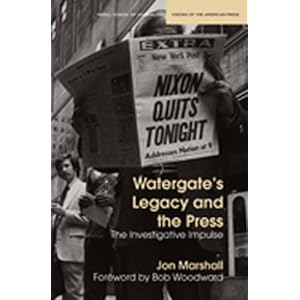I come from a family of writers. Between us, we are journalists, poets, novelists and essayists. We’ve produced a rather ridiculous amount of published work. I know this because I was just boxing some of the family books in preparation for a move. It took awhile.
 The latest offering is from my youngest brother, Jon, and is a thought-provoking and very readable book about the journalistic legacy of Watergate. My little bro teaches journalism at Northwestern University and authored the very successful News Gems blog. And I will personally vouch for his life-long interest in journalism. His first investigative reporting assignment was to find out what my high school boyfriend and I were doing on the couch and report back to my parents. He even used his instamatic camera as part of his assignment. I have tried to be nice to him ever since for fear of those pictures re-surfacing.
The latest offering is from my youngest brother, Jon, and is a thought-provoking and very readable book about the journalistic legacy of Watergate. My little bro teaches journalism at Northwestern University and authored the very successful News Gems blog. And I will personally vouch for his life-long interest in journalism. His first investigative reporting assignment was to find out what my high school boyfriend and I were doing on the couch and report back to my parents. He even used his instamatic camera as part of his assignment. I have tried to be nice to him ever since for fear of those pictures re-surfacing.
For those of us who inhaled the Watergate hearings and spent years wondering who Deep Throat was, it is a fresh look at familiar territory. For those who are too young to remember, it is necessary understanding of a critical part of our history. Fully understanding that my objectivity might be considered suspect, you might also want to check out this review,
“In regards to Watergate, learning how Bob Woodward and Carl Bernstein overcame a plethora of powerful government officials’ criticism to break the story, all while risking the Washington Post’s reputation, was inspiring. Instead, the duo sparked other publications to follow suit.
Marshall’s book addresses what impact they had on the industry, government and history itself. He dives into the public service role of journalism and explores examples of past and future opportunities for reporters.
The forward of the book was written by veteran journalist, Woodward himself, something Marshall said surprised and delighted him.”
Watergate’s Legacy and the Press: The Investigative Impulse by Jon Marshall is available on Amazon.
And in the interest of not playing favorites, you should also definitely read my brother Robert’s novel which came out a few years ago.
 Epic Days are becoming far too common place, and not in a good way. From today’s headlines–A no fly zone in Libya that seems to be taking out about as many civilians as targets in order to support rebels of uncertain political aspirations (perhaps on the assumption that they could hardly be crazier than Gaddafi and dammit, we need that oil). Memo to the good people of Sudan, Ivory Coast and other places where innocent civilians are under siege–sorry, your lives aren’t worth jack unless you’ve got something we want.
Epic Days are becoming far too common place, and not in a good way. From today’s headlines–A no fly zone in Libya that seems to be taking out about as many civilians as targets in order to support rebels of uncertain political aspirations (perhaps on the assumption that they could hardly be crazier than Gaddafi and dammit, we need that oil). Memo to the good people of Sudan, Ivory Coast and other places where innocent civilians are under siege–sorry, your lives aren’t worth jack unless you’ve got something we want. Early Saturday evening I decided to just ignore the fact that President Obama decided to start another war on a weekend after we’d just spent a week being totally traumatized by the disaster in Japan. I mean really? This couldn’t have waited until Monday? So I selfishly took two hours off to watch a cheesy movie without my laptop at my side. I know, you can see this coming– the second the credits are rolling I tune back in and bam! Now we have an oil slick too? I need to join a union, didn’t they bring us weekends?
Early Saturday evening I decided to just ignore the fact that President Obama decided to start another war on a weekend after we’d just spent a week being totally traumatized by the disaster in Japan. I mean really? This couldn’t have waited until Monday? So I selfishly took two hours off to watch a cheesy movie without my laptop at my side. I know, you can see this coming– the second the credits are rolling I tune back in and bam! Now we have an oil slick too? I need to join a union, didn’t they bring us weekends?